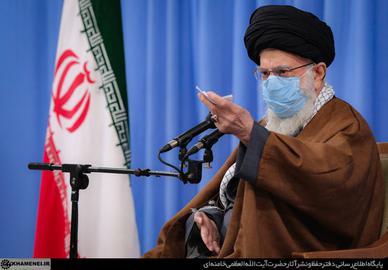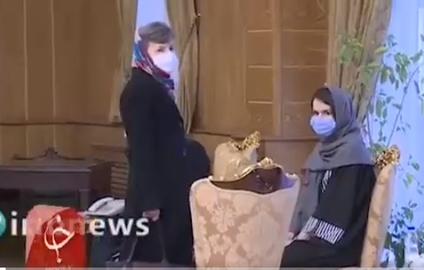The Supreme Leader has come out of quarantine to put an end to speculation that Iran could re-enter negotiations with the United States following the election of Joe Biden as the country’s 46th president. A day later, President Hassan Rouhani appeared to take a different view.
On Wednesday, November 25, speaking at a Supreme Economic Coordination Council meeting with President Rouhani, Speaker of Parliament Mohammad Bagher Ghalibaf and judiciary head Ebrahim Raeesi, Ayatollah Khamenei emphasized that negotiations would not resume between Iran and the US.
But, speaking at a cabinet meeting the next day, Rouhani said that his government was ready to take steps to revive the Joint Comprehensive Plan of Action (the JCPOA) and enter into discussions with the US that could result in the lifting of devastating sanctions imposed when the US left the agreement in 2017.
In part, Rouhani's address focused on criticizing Donald Trump. He dismissed him as "untrustworthy" and “populist," accusing his policies of being "anti-human rights" and finally saying, "Thank God this evil has now left the American people and the people of the region alone."
Rouhani also suggested a solution to the "Iran-US issue": returning to the pre-Trump era. ”The issue is very easy to resolve. Iran and the United States can decide and announce that they will return to the situation as it was on January 20, 2017."
January 20, 2017 was the day Donald Trump was sworn in as President of the United States.
Rouhani’s recent remarks were not his first message to the incoming Biden government, or his first apparent welcome for fresh negotiations. The New York Times reported on November 17 that Iranian deputy foreign minister Abbas Araghchi tried to send a message to those close to Biden that Iran was willing to abide by the obligations the JCPOA if the US would return to the deal and renew its obligations outlined in it. Iranian foreign ministry spokesperson Saeed Khatibzadeh referred to the report as “fake,” but the claim appeared in other media too.
Between Hope and Reality
The Islamic Republic is clearly pleased that Trump's "maximum pressure policy" will be replaced by the new policies of Joe Biden and potential efforts to bring an end to the sanctions. This apparent positive approach comes despite comments from high officials that it would not make a difference who was in the White House following the election on November 3.
Rouhani even implicitly said at the cabinet meeting on Wednesday that if US policy returned to the pre-Trump era and the sanctions were lifted, stances on key issues including Iran’s missile program and the Islamic Republic’s influence in the region could be negotiated or at least discussed. Returning to pre-January 20, 2017 conditions "can be a great solution to problems and completely change the course and the situation,” he said. "And then we can continue on to the next steps in various areas."
Although such promises seem eloquent and polemical, are they based on reality? Neither the Supreme Leader or the Revolutionary Guards are willing to negotiate on such issues, nor, according to some analysts, is the United States. Some argue that, instead, the new US administration will look to take advantage of the leverage it obtained under Trump. The title of The New York Times article sums up the majority of the analysis on the Iran-US relationship in the coming months: “Biden Wants to Rejoin Iran Nuclear Deal, but It Won’t Be Easy.”
There are two reasons for this difficulty: first, as Elliott Abrams, the US special envoy for Iran, has asked: Why should Biden not use the leverage that Trump has put in place? Secondly, the lifting of sanctions comes with profound legal and technical challenges.
Different Signals?
Rouhani's remarks on Wednesday, November 25, come one day after the Supreme Leader's very different remarks.
"We tried the path of lifting the sanctions once and negotiated for several years, but did not reach a conclusion," Ali Khamenei said during a meeting with members of the Supreme Economic Coordination Council. "And this is why we have to choose the path of neutralizing and overcoming sanctions."
These references, as well as his subsequent allusions to "missiles and the region," is a clear indication that the Leader is — currently, at least — opposed to negotiations, or at least unwilling to take public responsibility for them.
But Rouhani's words are not technically in direct contrast to Khamenei's words. Rouhani's didn't focus too intently on the missile program or Middle Eastern politics, and he is certainly thinking of his own legacy: he wants the situation to be more stable when he leaves office next August. Also, crucially, he is not talking solely to the United States; he has domestic factions in mind too.
But when it comes to these wider issues, the fact remains that for the last four years, whatever their approach and despite their disagreements over the JCPOA, the United States and Europe have had one view on the missile activities of Iran and its role and activities in the region.
Generally, and in “normal” times, Khamenei and the Revolutionary Guards are completely unwilling to abandon these key issues, which they see as crucial to proving the Islamic Republic’s influence on the world stage.
However, the leader of the Islamic Republic, who will soon be 82 years old, has already shown a tendency to deny and denounce whatever he sees fit, and then act in contradiction to those statements. In the past, he has voiced strong objections to negotiations with the United States publicly, while allowing discussions to take place behind the scenes.
In any case, Rouhani's remarks, coming just one day after Khamenei's statement, reveal his displeasure.
Amid the turmoil of Iran's economic crisis, the Supreme Economic Coordination Council, which is led by the heads of the three branches of government, had not met for about two months. But apart from the dangers of coronavirus, the meetings have been stalled because of increasing clashes between Rouhani and Mohammad Bagher Ghalibaf, the Speaker of Parliament.
The recent meeting at the Supreme Leader's office was an attempt to overcome this particular challenge. But immediately after leaving the meeting, Ghalibaf gave Rouhani some sarcastic advice on Twitter, urging the president to be "brave."
visit the accountability section
In this section of Iran Wire, you can contact the officials and launch your campaign for various problems



























comments